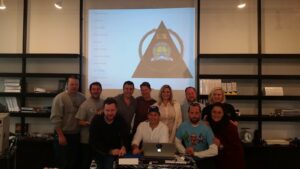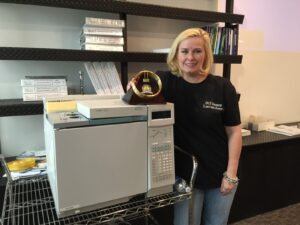 After 4 years of study and coursework, I passed the ACS Forensic Lawyer-Scientist exam this week in Chicago. It’s been a long but rewarding road. I want to thank the whole staff at Axion Labs for the amazing education and support. Thank you Dr. Lee Polite, Dr. Harold McNair, Lew, Mary Beth, Justin McShane, Josh Lee, Katie McShane, Ron Moore, Dr. Jimmie Valentine and Heather Harris. The following describes the program:
After 4 years of study and coursework, I passed the ACS Forensic Lawyer-Scientist exam this week in Chicago. It’s been a long but rewarding road. I want to thank the whole staff at Axion Labs for the amazing education and support. Thank you Dr. Lee Polite, Dr. Harold McNair, Lew, Mary Beth, Justin McShane, Josh Lee, Katie McShane, Ron Moore, Dr. Jimmie Valentine and Heather Harris. The following describes the program:
 With more than 161,000 members, the American Chemical Society (ACS) is the world’s largest scientific society and one of the world’s leading sources of authoritative scientific information. The Chemistry and the Law Division (CHAL) has over 1400 members. A nonprofit organization, chartered by Congress, ACS is at the forefront of the evolving worldwide chemical enterprise and the premier professional home for chemists, chemical engineers and related professions around the globe. The ACS is dynamic and visionary, committed to “Improving people’s lives through the transforming power of chemistry.” This vision ─ developed and adopted by the ACS Board of Directors after broad consultation with the membership ─ fully complements the ACS Mission statement, which is “to advance the broader chemistry enterprise and its practitioners for the benefit of Earth and its people.” Together, these two statements represent the ACS’s ultimate reason for being and provide a strategic framework for our efforts.
With more than 161,000 members, the American Chemical Society (ACS) is the world’s largest scientific society and one of the world’s leading sources of authoritative scientific information. The Chemistry and the Law Division (CHAL) has over 1400 members. A nonprofit organization, chartered by Congress, ACS is at the forefront of the evolving worldwide chemical enterprise and the premier professional home for chemists, chemical engineers and related professions around the globe. The ACS is dynamic and visionary, committed to “Improving people’s lives through the transforming power of chemistry.” This vision ─ developed and adopted by the ACS Board of Directors after broad consultation with the membership ─ fully complements the ACS Mission statement, which is “to advance the broader chemistry enterprise and its practitioners for the benefit of Earth and its people.” Together, these two statements represent the ACS’s ultimate reason for being and provide a strategic framework for our efforts.As all of you are aware the ACS sponsors and approves the series of three courses that are offered for lawyers through Axion Analytical Labs in Chicago, IL. The ACS Education Committee has previously approved all 3 courses. Details on the 3 classes can be found here: http://www.forensicchromatography.com/
- The first class “Forensic Chromatography” involves DUI ethanol based analysis by HS-GC-FID.
- The second class “Forensic Drug Analysis” involves the instrumental analysis of solid drugs in their pre-consumption form using FTIR, GC-MS, Colormetrics, Microscopy, Thin Layer Chromatography, etc.
- The third class “Forensic Principles of DUID” involves the pharmacology of drugs, also driving issues in drugs, as well as instrumental analysis using GC-MS.
All three classes are hands-on classes with labs and actual sample development, testing, and data interpretation. We use the instruments in the same way, using the same matrices in the Axion Laboratory as an analyst would in a forensic laboratory. They are wonderfully educational and wholly unique.
In talking with many, both inside and outside of the ACS, the instructors of these courses wanted to recognize the accomplishment and time commitment of the attorneys who truly learned the science. It had to be something beyond simply an attendance based achievement, but also recognized retention of the highly specialized knowledge.
We are proud to announce that after many months of petitioning and meeting with various entities of the ACS, we achieved our goal. On May 21, 2014, there was a unanimous vote to approve the recognition. It is formally called “The ACS Forensic Lawyer-Scientist Designation as recognized by the Chemistry and the Law Division of the ACS” but has also been approved to be called simply having earned “The ACS-CHAL Forensic Lawyer-Scientist Designation” or the person as an “ACS-CHAL Forensic Lawyer-Scientist.” These titles are collectively known as “The Designation.”
Eligibility:
To earn an ACS Forensic Lawyer-Scientist Designation as recognized by the Chemistry and the Law Division of the ACS, the prospects must complete coursework outlined below and then take and pass a proficiency test based upon what is learned in those courses. The official qualification criteria are as follows:
- You must be and remain a member in good standing with the ACS-Chemistry and the Law Division.
- You must be a lawyer in good standing with your state bar.
- You must answer questions put to you by CHAL about your bar status upon demand as well as your compliance with all terms and conditions of the designation.
- You must successfully complete the ACS Forensic Chromatography Course TWO TIMES.
- You must successfully complete the ACS Solid Drug Dose (Forensic Drug Analysis) Course.
- You must successfully complete the ACS Forensic DUID (Forensic Principles of DUID) Course.
- You must pass a proficiency and knowledge examination based upon the courses.
- You must agree that the advertising and display of any credentials will be done only in a tasteful and ethical manner per the ACS and your state bar rules and per the language of “ACS Forensic Lawyer-Scientist Designation as recognized by the Chemistry and the Law Division of the ACS” or shortened simply to having earned “The ACS-CHAL Forensic Lawyer-Scientist Designation” or referring to the person as an “ACS-CHAL Forensic Lawyer-Scientist.”
- You must agree that that these rules and terms may change without future notice or right to appeal.
